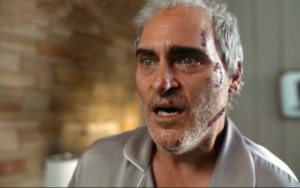BEAU IS AFRAID: UNRATABLE. “often feels like a three-hour panic attack.”
 Magnificent and confounding in equal measure, “Beau is Afraid,” a new, three-hour epic from “Midsommar” director Ari Aster and now playing in theatres, is a nightmarish trek through a mishmash of mommy issues, anxiety and tragedy. Imagine a paranoid “Lord of the Rings” style quest reimagined by Luis Buñuel with a darkly comedic “After Hours” vibe and a hint of Thomas “You Can’t Go Home Again” Wolfe and you’ll be on the road to understanding Beau’s surreal journey.
Magnificent and confounding in equal measure, “Beau is Afraid,” a new, three-hour epic from “Midsommar” director Ari Aster and now playing in theatres, is a nightmarish trek through a mishmash of mommy issues, anxiety and tragedy. Imagine a paranoid “Lord of the Rings” style quest reimagined by Luis Buñuel with a darkly comedic “After Hours” vibe and a hint of Thomas “You Can’t Go Home Again” Wolfe and you’ll be on the road to understanding Beau’s surreal journey.
Joaquin Phoenix plays the title character, a neurotic, over-medicated man whose father died at the moment of his son’s conception. The loss forever colored his life, leaving him lost in a sea of paranoia and uncertainty. “I am so sorry for what your daddy passed down to you,” says his overbearing mother Mona (Patti LaPone).
Beau’s already chaotic life is forever changed by a missed plane, a new prescription and a home invasion. Set off on an odyssey to return home for his mother’s funeral, circumstance continually keep him off track. First, he finds himself the reluctant patient of affable suburban caregivers Roger and Grace (Nathan Lane and Amy Ryan), their troubled daughter (Kylie Rogers) and a war vet with PTSD.
Then, a narrow escape finds him in the embrace of a travelling experimental theater troupe whose storytelling transports him into an animated folk tale of searching, struggle and solace.
Finally, bloodied and bruised, he arrives home to confront his past, face his fears and come to grips with the trauma that hangs over his life like a shroud.
“Beau is Afraid” is a complicated movie, laden with allegory and symbolism, that confronts the aftereffects of loss and grief. It’s familiar terrain for Aster, whose previous films, “Hereditary” and “Midsommar,” were also studies in intergenerational trauma.
But the new movie is anything but familiar.
It is a psychological dramedy that dives deep into how Beau’s trauma has molded every aspect of his life and lead to a breakdown, one we witness from his point-of-view, in real time. It’s a harrowing trip as Beau slowly loses his grip on reality, and his paranoia shapes the movie’s narrative.
Aster is uncompromising in his portrayal of Beau’s state of mind. His previous movies were more visually shocking, featuring images more aligned to traditional horror. “Beau is Afraid” has less overt horror. It’s more concerned with the psychological, the confusion, fear and anxiety that drives Beau. To convey this, Phoenix, in an internal performance, plays the character as a shell. The movie revolves around him and his state of mind, but he is a reactive character, one who responds to, rather than instigates, the action. It’s interesting, deeply felt work but the closed down, Chauncey Gardiner nature of the character makes him difficult to embrace.
Given the unsettled nature of the real world, audiences may understand, relate or sympathize with Beau’s all-encompassing fear, but the absurdism woven into Phoenix’s childlike performance, particularly in the film’s second half, wears thin.
“Beau is Afraid” is the weirdest film on Aster’s already proudly weird IMDB page. It may be the definition of a film that is not for everyone, but it cannot be faulted for its uncompromising vision. As a search for meaning in life, for closure from trauma, for freedom from fear, from relief from distended testicles (Yup! You read that right), it was never going to be a feel-good flick. So, instead, it swings for the fences, burrowing in on its grandiose emotional ideas even if it often feels like a three-hour panic attack.
Unpredictable, unexpected and ultimately, unexplainable, it’s challenging cinema that connects on a subconscious level.
